您好,登錄后才能下訂單哦!
您好,登錄后才能下訂單哦!
這篇文章給大家分享的是有關ASP.NET MVC重寫RazorViewEngine實現多主題切換的示例分析的內容。小編覺得挺實用的,因此分享給大家做個參考,一起跟隨小編過來看看吧。
在ASP.NET MVC中來實現主題的切換一般有兩種方式,一種是通過切換皮膚的css和js引用,一種就是通過重寫視圖引擎。通過重寫視圖引擎的方式更加靈活,因為我不僅可以在不同主題下面布局和樣式不一樣,還可以讓不同的主題下面顯示的數據條目不一致,就是說可以在某些主題下面添加一下個性化的東西。
本篇我將通過重寫視圖引擎的方式來進行演示,在這之前,我假設你已經具備了MVC的一些基礎,我們先來看下效果:
系統登錄后是默認主題,當我們點擊切換主題之后,左側菜單欄的布局變了,右側內容的樣式也變了,而地址欄是不變的。界面UI用的metronic,雖然官網是收費的,但是在天朝,總是可以找到免費的。官方地址:http://keenthemes.com/preview/metronic/
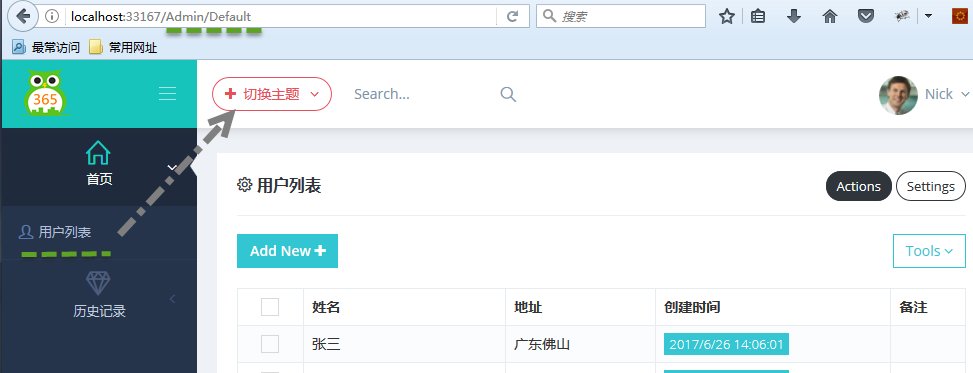
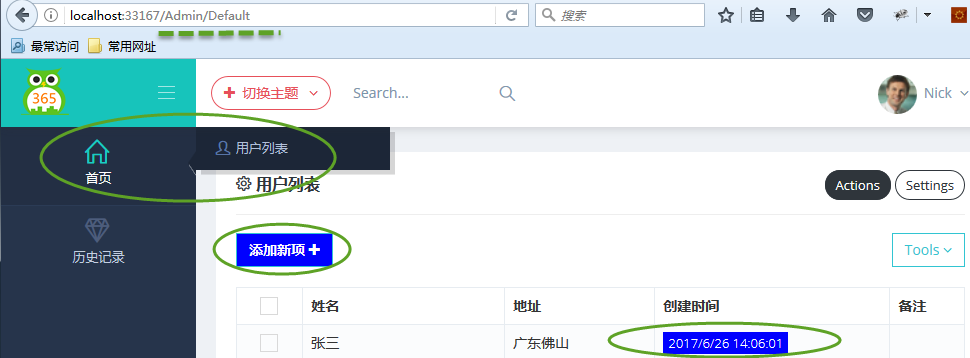
在這里,我使用了分區域、分模塊(按獨立的業務功能劃分)的方式,一個模塊就是一個獨立的dll,在這里Secom.Emx.Admin和Secom.Emx.History就是兩個獨立的模塊,并分別創建了區域Admin和History。
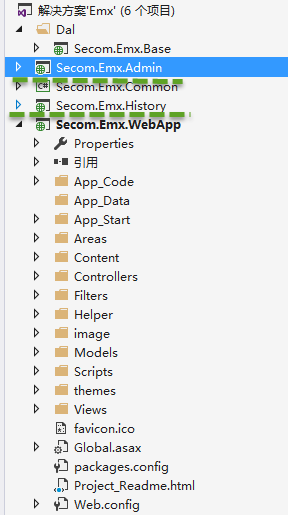
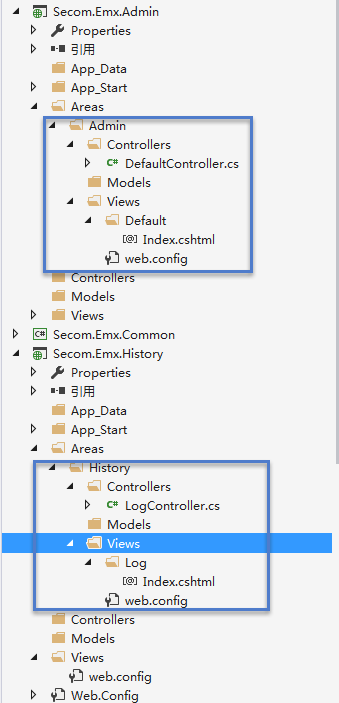
你會發現Secom.Emx.Admin模型下面的Areas目錄和Secom.Emx.WebApp中的目錄是一模一樣的,其實我最初不想在模塊項目中添加任何的View,但是為了方便獨立部署還是加了。
右鍵單擊項目Secom.Emx.Admin,選擇“屬性”——“生成事件”添加如下代碼:
xcopy /e/r/y $(ProjectDir)Areas\Admin\Views $(SolutionDir)Secom.Emx.WebApp\Areas\Admin\Views
這命令很簡單,其實就是當編譯項目Secom.Emx.Admin的時候,將項目中的Views復制到Secom.Emx.WebApp項目的指定目錄下。
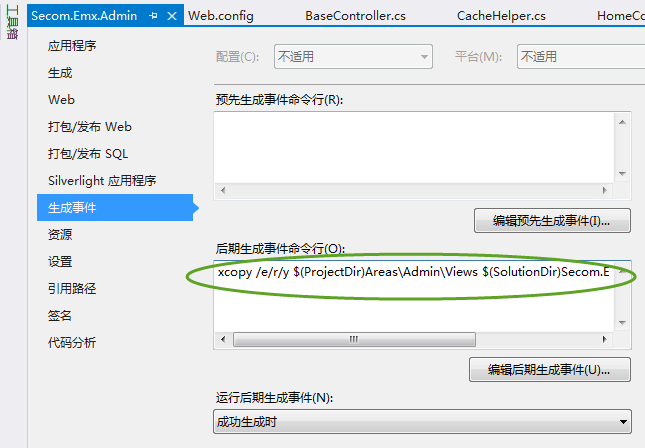
區域配置文件我放置到了Secom.Emx.WebApp中,其實你完全可以獨立放置到一個類庫項目中,因為注冊區域路由的后,項目最終會尋找bin目錄下面所有繼承了AreaRegistration類的,然后讓WebApp引用這個類庫項目,Secom.Emx.WebApp項目添加Secom.Emx.Admin、Secom.Emx.History的引用。
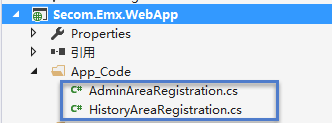
AdminAreaRegistration代碼如下:
using System.Web.Mvc;
namespace Secom.Emx.WebApp
{
public class AdminAreaRegistration : AreaRegistration
{
public override string AreaName
{
get
{
return "Admin";
}
}
public override void RegisterArea(AreaRegistrationContext context)
{
context.MapRoute(
"Admin_default",
"Admin/{controller}/{action}/{id}",
new { action = "Index", id = UrlParameter.Optional },
namespaces:new string[1] { "Secom.Emx.Admin.Areas.Admin.Controllers" }
);
}
}
}注意命名空間和后面添加的 namespaces:new string[1] { "Secom.Emx.Admin.Areas.Admin.Controllers" },這個命名空間就是獨立模塊Secom.Emx.Admin下面的控制器所在的命名空間。
HistoryAreaRegistration代碼如下:
using System.Web.Mvc;
namespace Secom.Emx.WebApp
{
public class HistoryAreaRegistration : AreaRegistration
{
public override string AreaName
{
get
{
return "History";
}
}
public override void RegisterArea(AreaRegistrationContext context)
{
context.MapRoute(
"History_default",
"History/{controller}/{action}/{id}",
new { action = "Index", id = UrlParameter.Optional },
namespaces:new string[1] { "Secom.Emx.History.Areas.History.Controllers" }
);
}
}
}我們先看下RazorViewEngine的原始構造函數如下:
public RazorViewEngine(IViewPageActivator viewPageActivator)
: base(viewPageActivator)
{
AreaViewLocationFormats = new[]
{
"~/Areas/{2}/Views/{1}/{0}.cshtml",
"~/Areas/{2}/Views/{1}/{0}.vbhtml",
"~/Areas/{2}/Views/Shared/{0}.cshtml",
"~/Areas/{2}/Views/Shared/{0}.vbhtml"
};
AreaMasterLocationFormats = new[]
{
"~/Areas/{2}/Views/{1}/{0}.cshtml",
"~/Areas/{2}/Views/{1}/{0}.vbhtml",
"~/Areas/{2}/Views/Shared/{0}.cshtml",
"~/Areas/{2}/Views/Shared/{0}.vbhtml"
};
AreaPartialViewLocationFormats = new[]
{
"~/Areas/{2}/Views/{1}/{0}.cshtml",
"~/Areas/{2}/Views/{1}/{0}.vbhtml",
"~/Areas/{2}/Views/Shared/{0}.cshtml",
"~/Areas/{2}/Views/Shared/{0}.vbhtml"
};
ViewLocationFormats = new[]
{
"~/Views/{1}/{0}.cshtml",
"~/Views/{1}/{0}.vbhtml",
"~/Views/Shared/{0}.cshtml",
"~/Views/Shared/{0}.vbhtml"
};
MasterLocationFormats = new[]
{
"~/Views/{1}/{0}.cshtml",
"~/Views/{1}/{0}.vbhtml",
"~/Views/Shared/{0}.cshtml",
"~/Views/Shared/{0}.vbhtml"
};
PartialViewLocationFormats = new[]
{
"~/Views/{1}/{0}.cshtml",
"~/Views/{1}/{0}.vbhtml",
"~/Views/Shared/{0}.cshtml",
"~/Views/Shared/{0}.vbhtml"
};
FileExtensions = new[]
{
"cshtml",
"vbhtml",
};
}然后新建CustomRazorViewEngine繼承自RazorViewEngine,對View的路由規則進行了重寫,既然可以重寫路由規則,那意味著,你可以任意定義規則,然后遵守自己定義的規則就可以了。需要注意的是,要注意路由數組中的順序,查找視圖時,是按照前后順序依次查找的,當找到了視圖就立即返回,不會再去匹配后面的路由規則。為了提升路由查找效率,我這里刪除了所有vbhtml的路由規則,因為我整個項目中都采用C#語言。
using System.Web.Mvc;
namespace Secom.Emx.WebApp.Helper
{
public class CustomRazorViewEngine : RazorViewEngine
{
public CustomRazorViewEngine(string theme)
{
if (!string.IsNullOrEmpty(theme))
{
AreaViewLocationFormats = new[]
{
//themes
"~/themes/"+theme+"/views/Areas/{2}/{1}/{0}.cshtml",
"~/themes/"+theme+"/Shared/{0}.cshtml"
"~/Areas/{2}/Views/{1}/{0}.cshtml",
"~/Areas/{2}/Views/Shared/{0}.cshtml"
};
AreaMasterLocationFormats = new[]
{
//themes
"~/themes/"+theme+"/views/Areas/{2}/{1}/{0}.cshtml",
"~/themes/"+theme+"/views/Areas/{2}/Shared/{0}.cshtml",
"~/themes/"+theme+"/views/Shared/{0}.cshtml",
"~/Areas/{2}/Views/{1}/{0}.cshtml",
"~/Areas/{2}/Views/Shared/{0}.cshtml"
};
AreaPartialViewLocationFormats = new[]
{
//themes
"~/themes/"+theme+"/views/Shared/{0}.cshtml",
"~/Areas/{2}/Views/{1}/{0}.cshtml",
"~/Areas/{2}/Views/Shared/{0}.cshtml"
};
ViewLocationFormats = new[]
{
//themes
"~/themes/"+theme+"/views/{1}/{0}.cshtml",
"~/Views/{1}/{0}.cshtml",
"~/Views/Shared/{0}.cshtml"
};
MasterLocationFormats = new[]
{
//themes
"~/themes/"+theme+"/views/Shared/{0}.cshtml",
"~/Views/{1}/{0}.cshtml",
"~/Views/Shared/{0}.cshtml"
};
PartialViewLocationFormats = new[]
{
//themes
"~/themes/"+theme+"/views/Shared/{0}.cshtml",
"~/Views/{1}/{0}.cshtml",
"~/Views/Shared/{0}.cshtml"
};
FileExtensions = new[]{"cshtml"};
}
}
}
}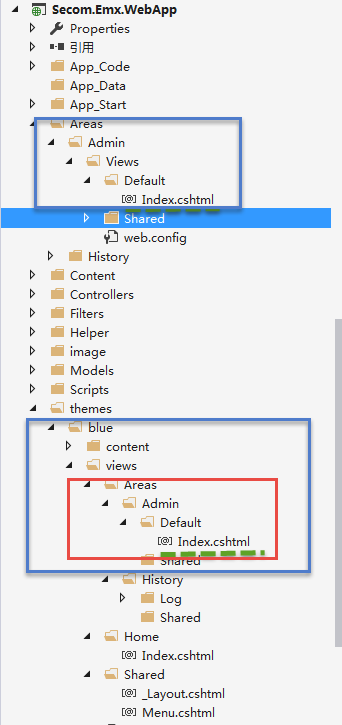
重寫后,我們的路由規則將是這樣的:當沒有選擇主題的情況下,沿用原來的路由規則,如果選擇了主題,則使用重寫后的路由規則。
新的路由規則:在選擇了主題的情況下,優先查找thems/主題名稱/views/Areas/區域名稱/控制器名稱/視圖名稱.cshtml,如果找不到再按照默認的路由規則去尋找,也就是Areas/區域名稱/Views/控制器名稱/視圖名稱.cshtml
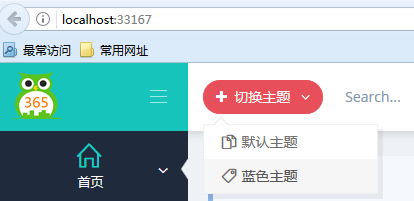
切換主題View代碼:
<div class="btn-group">
<button type="button" class="btn btn-circle btn-outline red dropdown-toggle" data-toggle="dropdown">
<i class="fa fa-plus"></i>
<span class="hidden-sm hidden-xs">切換主題 </span>
<i class="fa fa-angle-down"></i>
</button>
<ul class="dropdown-menu" role="menu">
<li>
<a href="javascript:setTheme('default')">
<i class="icon-docs"></i> 默認主題
</a>
</li>
<li>
<a href="javascript:setTheme('Blue')">
<i class="icon-tag"></i> 藍色主題
</a>
</li>
</ul>
</div>
<script type="text/javascript">
function setTheme(themeName)
{
window.location.href = "/Home/SetTheme?themeName=" + themeName + "&href=" + window.location.href;
}
</script>當用戶登錄成功的時候,從Cookie中讀取所選主題信息,當Cookie中沒有讀取到主題記錄時,則從Web.config配置文件中讀取配置的主題名稱,如果都沒有讀取到,則說明是默認主題,沿用原有的視圖引擎規則。
在后臺管理界面,每次選擇了主題,我都將主題名稱存儲到Cookie中,默認保存一年,這樣當下次再登錄的時候,就能夠記住所選的主題信息了。
using System;
using System.Web.Mvc;
using Secom.Emx.WebApp.Helper;
using System.Web;
using Secom.Emx.Common.Controllers;
namespace Secom.Emx.WebApp.Controllers
{
public class HomeController : BaseController
{
string themeCookieName = "Theme";
public ActionResult Index()
{
ViewData["Menu"] = GetMenus();
return View();
}
public ActionResult SetTheme(string themeName,string href)
{
if (!string.IsNullOrEmpty(themeName))
{
Response.Cookies.Set(new HttpCookie(themeCookieName, themeName) { Expires = DateTime.Now.AddYears(1) });
}
else
{
themeName = Request.Cookies[themeCookieName].Value ?? "".Trim();
}
Utils.ResetRazorViewEngine(themeName);
return string.IsNullOrEmpty(href)? Redirect("~/Home/Index"):Redirect(href);
}
public ActionResult Login()
{
string themeName = Request.Cookies[themeCookieName].Value ?? "".Trim();
if (!string.IsNullOrEmpty(themeName))
{
Utils.ResetRazorViewEngine(themeName);
}
return View();
}
}
}Utils類:
using System.Configuration;
using System.Web.Mvc;
namespace Secom.Emx.WebApp.Helper
{
public class Utils
{
private static string _themeName;
public static string ThemeName
{
get
{
if (!string.IsNullOrEmpty(_themeName))
{
return _themeName;
}
//模板風格
_themeName =string.IsNullOrEmpty(ConfigurationManager.AppSettings["Theme"])? "" : ConfigurationManager.AppSettings["Theme"];
return _themeName;
}
}
public static void ResetRazorViewEngine(string themeName)
{
themeName = string.IsNullOrEmpty(themeName) ? Utils.ThemeName : themeName;
if (!string.IsNullOrEmpty(themeName))
{
ViewEngines.Engines.Clear();
ViewEngines.Engines.Add(new CustomRazorViewEngine(themeName));
}
}
}
}感謝各位的閱讀!關于“ASP.NET MVC重寫RazorViewEngine實現多主題切換的示例分析”這篇文章就分享到這里了,希望以上內容可以對大家有一定的幫助,讓大家可以學到更多知識,如果覺得文章不錯,可以把它分享出去讓更多的人看到吧!
免責聲明:本站發布的內容(圖片、視頻和文字)以原創、轉載和分享為主,文章觀點不代表本網站立場,如果涉及侵權請聯系站長郵箱:is@yisu.com進行舉報,并提供相關證據,一經查實,將立刻刪除涉嫌侵權內容。